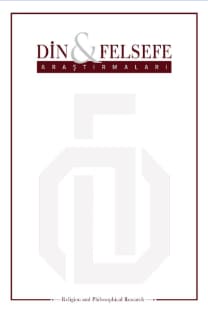Evren Kendi Kendine Ortaya Çıkmış Olabilir mi?
Günümüzde en çok tartışılan teistik argümanlardan biri evrenin başlangıcından hareketle Tanrı’nın varlığını göstermeye çalışan ve Batı’da Kelam’ın kozmolojik delili olarak anılan Hûdus delilidir. Büyük patlama modelinin başarısından sonra ateist felsefeciler evrenin başlangıcını reddetmek yerine, argümanın nedensel öncülünü eleştirmeyi tercih etmeye başladılar. Nedensellik öncülü ortaya çıkan, zamanda başlangıcı olan her şeyin bir nedeni olması gerektiğini savunur. Bu makalede çağdaş Hudûs delinin nedensellik öncülünü inceleyeceğiz. Önce delilin en önemli çağdaş savunucusu William Lane Craig’in nedensellik öncülü lehinde getirdiği üç argümanı tanıtacak ve değerlendirmeye çalışacağız. Sonraki bölümlerde nedensellik öncülü lehinde iki yeni argüman savunmaya çalışacağız. Birinci argümanımızda nedensellik öncülünün reddedilmesi halinde radikal septisizme düşeceğimiz göstermeye çalışılacaktır. Radikal septisizmin saçma olmasından hareketle nedensellik öncülünün muhtemelen doğru olduğunu savunacağız. İkinci argümanımızda ise en iyi açıklama olarak çıkarım metodunun, zamanda başlangıcı olan bir evrenin bir nedeni olması gerektiğini desteklediği savunulacaktır. Evrenin başlangıcının bir nedeni yoksa, açıklaması olamayacağını göstermeye çalışacağız. Ancak aday açıklamalar bulunabilecekken, evrenin bir açıklaması olmadığını iddia etmek en iyi açıklama olarak çıkarım metodu ile çelişmesinden hareketle evrenin bir nedensel açıklaması olması gerektiğini, dolayısı ile bir neden olduğunu savunacağız.
Anahtar Kelimeler:
Kelam’ın Kozmolojik Argümanı, Nedensellik İlkesi, Hudûs Delili, Kelam’ın Kozmolojik Argümanı, Tanrı’nın Varlığı.
Can the Universe Begin to Exist Without a Cause?
One of the most discussed theistic arguments is the Huduth argument, known as the Kalam cosmological argument in West, which tries to establish existence of God from the beginning of the universe. After the success of the Big Bang Model, atheist philosophers began to prefer to criticize the causal premise of the argument rather than rejecting the origin of the universe. The causality premise argues that everything that has a beginning in time must have a cause. In this paper, we will analyze the causality premise of the Kalam Cosmological Argument. First, we will present and evaluate the three arguments given in favor of the causality premise by the most prominent defender of the argument William Lane Craig. In the following sections, we will present two arguments in favor of the causality premise. In the first argument, we will argue that denying the causality premise leads to radical skepticism. Assuming radical skepticism is absurd, we will argue that causality premise must be true. In the second argument, we will defend the claim that inference to the best explanation principle supports the proposition that the universe with a beginning must have a cause. We will first argue that if the beginning of the universe does not have a cause, then this phenomenon has no explanation. But inference to best explanation implies that we should prefer any explanation over no explanation, and since only type of explanation in favor of the beginning of the universe can be causal explanation, the universe must have a cause.
___
- Aliseda, Atocha. Abductive Reasoning: Logical Investigations into Discovery and Explanation. Dordrecht: Springer, 2006.
- Craig, W. L. The Kalām Cosmological Argument. London: The Macmillan Press, 1979.
- Craig, W. L. Cosmological Argument from Plato to Leibnitz. Oregon: Wipf & Stock Publishing, 2001.
- Craig, W. L. ve Sinclair, J. D. “The Kalām Cosmological Argument,” The Blackwell Companion to Natural Theology içinde, editör W.L. Craig ve J. P. Moreland, 101-201. London: Blackwell, 2009.
- Doko, E. “Bilfiil Sonsuzun Imkansızlığına Dayanmayan Yeni Bir Hudus Delili Savuması”, Felsefe Tartışmaları, 54 (2017):61-79.
- Doko, E. “Kalam Cosmological Argument and the Modern Science”. Kader, 16(1) (2018):1-13.
- Doko, E. Metafiziğin Temelleri. İstanbul: Mona Yayınları, 2020.
- Duhem, P. The Aim and Structure of Physical Theory. NJ: Princeton University Press, 1954.
- Ellis, G., J. Murugan, and C. Tsagas, “The Emergent Universe: An Explicit Construction”, Classical and Quantum Gravity 21 (2004): 233–250
- Hackett, S. The Resurraction of Theism. Chicago: Moody Press, 1957.
- Hawking, S. W. ve G.F.R. Ellis. The large scale structure of space-time. Cambridge: Cambridge University Press, 1973.
- Koons, R. “A New Kalam Argument: Revenge of the Grim Reaper”, Noûs, 48 (2) (2014): 256-267
- Krauss, Lawrence M. A Universe from Nothing: Why There Is Something Rather Than Nothing. New York: Free Press, 2012.
- Kroemer, H. ve C. Kittel. Thermal Physics. W. H. Freeman Company, 1980.
- Lipton, Peter, "Inference to the Best Explanation", .), A Companion to the Philosophy of Science içinde, editör W.H. Newton-Smith , 184-193. London: Blackwell, 2000.
- Lipton, Peter. Inference to the Best Explanation. London: Routledge, 2004. Mukhanov, V. Physical Foundations of Cosmology. Cambridge: Cambridge University Press, 2005.
- Niiniluoto, Ilkka "Covering law model", The Cambridge Dictionary of Philosophy içinde, editör. Robert Audi. New York: Cambridge University Press, 1996.
- Nowacki, M.R. The Kalām Cosmological Argument for God. New York: Barnes and Noble, 2007.
- Oderberg, D.S. “Traversal of the Infinite, the ‘Big Bang,’ and the Kalam Cosmological argument”, Philosophia Christi, 4(2) (2002) :305–344.
- Oppy, Graham, “Professor William Craig’s Criticisms of Critiques of Kalam Cosmological Arguments by Paul Davies, Stephen Hawking, and Adolf Grunbaum”, Faith and Philosophy 12(2) (1994): 237-250.
- Steinhardt, P. ve N. Turok, “A Cyclic Model of the Universe” Science 296 (2002): 1,436–39
- Tolman, R. C. Relativity, Thermodynamics, and Cosmology. New York: Dover, 1987.
- Quine, W. V. O. “Two Dogmas of Empiricism”, Logical Point of View içinde, 20-46. Cambridge, MA: Harvard University Press, 1951).
- Yayın Aralığı: Yılda 2 Sayı
- Başlangıç: 2018
- Yayıncı: Din Felsefesi Derneği
Sayıdaki Diğer Makaleler
Liber XXIV Philosophorum (Yirmi Dört Filozofun Kitabı): On İkinci Yüzyıldan Hermetik Bir Metin
İrfan A. Khan’ın Kuran Hermenötiğine Bir Giriş
İmam Mâtürîdî’nin Ahlâk Düşüncesinde Ahlakın Kaynağı Olarak İnsan Tabiatı
Alaa Al-Din Arafat, Egypt in Crisis: The Fall of Islamism and Prospects of Democratization
Evren Kendi Kendine Ortaya Çıkmış Olabilir mi?
Hume’un Algılar Demeti Kuramı ve Zihin Felsefesi Tartışmalarına Etkisi
